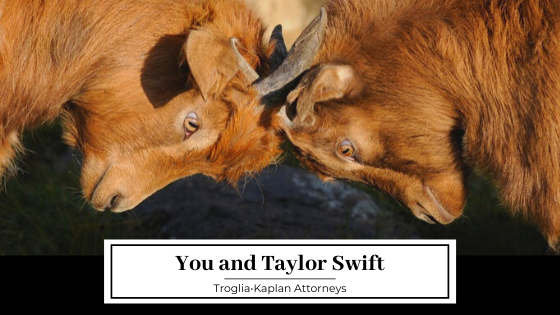You and Taylor Swift
Whether you follow the music industry or not, it has been hard to avoid the ongoing saga that is Taylor Swift. There are hundreds of articles out there about all of the particulars and specifics of Taylor’s ongoing fight with Big Machine, the Carlyle Group and, most publicly, Scooter Braun. (Here’s one.). While relating to a super star who has a catalog worth $300,000,000.00 may be difficult, ownership of your art is infinitely relatable to musicians.
Let’s start with the basics. For the purposes of this article, we will focus on a traditional label recording agreement. When you sign a recording agreement you are agreeing to sell your recordings (the “masters”) to a label. They label will require you to deliver a certain number of records or albums over a certain period of time. In exchange they may pay you an advance (a loan against the money that is earned from those records) and will agree to pay you a certain percentage of the revenue that is earned from the exploitation (sales, streams, licenses etc.) of those records. That percentage will only be paid after they recoup all of the money that they have previously paid to you as an advance as well as amounts paid to record that music and oftentimes, to promote or market the records.
So that is how the money part of a recording typically works (more or less). The term of a recording agreement is a whole other animal.
Let’s use Ms. Swift as an example. Her original deal with Big Machine was to deliver 6 albums. She completed that delivery at some point in 2018. She recouped shortly thereafter (obviously). So she was free to go explore the market as a free-agent. But here is where it gets interesting and where many of our clients get confused. Just because the term of the recording agreement expired does not mean that the label gives up ownership of the records that were already delivered. That ownership is perpetual (aka forever). On top of owning the masters forever, Taylor’s recording agreement (as with most of them) had a restriction on re-recording of the masters. That means that for an extended period of time, Taylor cannot re-record any of the songs from the albums that are owned by the label. This restriction has led to the current and very public dispute with Scooter over whether Taylor can actually perform any of the songs owned by Big Machine/Scooter/Carlyle at the American Music Awards where Taylor is being honored for her legacy as a recording artist. Why would she be prohibited from performing these songs? Scooter and his squad were making the argument that the AMA’s will be recorded so that the re-recording restriction contained in her contract prohibits the performance. This has since been resolved and Taylor will be able to sing her heart out on all of her past hits at the award show.
Again, Taylor’s struggle is not exactly one that most musicians face. Most musicians do not experience a major venture capital firm (Carlyle) headed by one of the most public and powerful music industry moguls (Scooter, who also happens to be sworn enemy of Taylor’s), purchasing their legacy of master recordings for hundreds of millions of dollars. However, anyone entering into a recording agreement should know that they are selling, assigning and transferring the copyright and ownership of her recorded music to a third party. Accordingly, they will not own and certainly will not be in control of their past art.
For some, selling their art is not an issue. It is a centuries old practice that extends beyond music (think paintings, sculptures, movies etc.). However, for others it can be a tough pill to swallow. For those musicians who are aware and informed of the current financial model for the music industry, they know that owning their masters is not just artistically important but financially significant as well. So what is an artist to do?
First off and most importantly, know what you are signing. Find someone who has experience dealing with this fact pattern. Whether that is a lawyer or manager or just a musician friend, consult with them and ask questions. Further to that point, ask the people that you are considering signing with what their intention is. If the language of the agreement doesn’t match that intention, you should probably run away; quickly. Second, know that there is no longer just one type of recording agreement. The days of standard completely one-sided recording agreements are dead. While labels will always try to get the most out of any signing, musicians have options. There are license deals where you essentially license your masters to a label for a set amount of time. Once that time is over, the master revert back to you. There are deals to be struck with distributors. Distributors of music will fund artist projects without taking any ownership and simply recoup off of the streaming revenue that they are earning by distributing your music. There are a lot of carve outs and exceptions that can be drafted into a recording agreement that can solve for the situation that Ms. Swift has found herself.
If you are Taylor Swift today versus Taylor Swift at 15 you not only are ridiculously successful and rich but you are operating without a tremendous amount of leverage. Her new deal with Universal/Republic undoubtedly contains language that allows her to share in the ownership of her new masters or at the very least allots her the ability to buy them back at the end of her term. So while you may not have her catalog and leverage, you can at least arm yourself with knowledge, understanding and a team to help you navigate your way to Swift-like stardom!
This article is for informational purposes only. If you have any questions, please contact our team at Troglia•Kaplan Attorneys.

